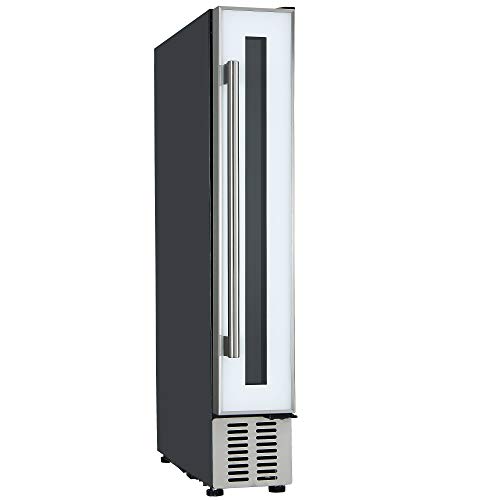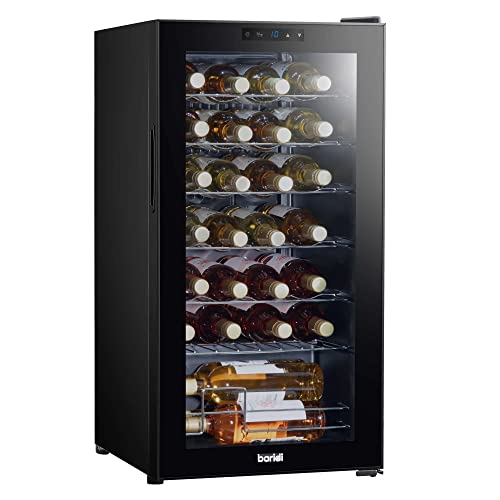11 Creative Ways To Write About Beer And Wine Refrigerator
페이지 정보

본문
 Choosing a Beverage and Wine Refrigerator
Choosing a Beverage and Wine RefrigeratorThis dual-zone refrigerator is perfect to store and cool both wine and beer. It can be built-in or freestanding, with a sleek seamless door that looks stunning in any space.
 Although vibrations are generally innocuous but they can disrupt the sediment in a bottle and cause chemical reactions that might not be apparent. Over time, this can reduce esters and dull flavors.
Although vibrations are generally innocuous but they can disrupt the sediment in a bottle and cause chemical reactions that might not be apparent. Over time, this can reduce esters and dull flavors.Humidity Control
Humidity is the amount water vapor in air. It fluctuates throughout the day because of various factors. Temperature, precipitation, wind and other environmental conditions can dramatically impact the level of humidity. Achieving the right level of humidity is crucial for a variety of reasons. The humidity affects weather patterns, indoor air and even wine storage. The delicate composition of a wine is made up of numerous aromatic compounds that are sensitive to changes in humidity. If the humidity is too high, it can affect the balance of these substances and alter the taste of a wine. A wine refrigerator can help to keep humidity levels at an optimal level to safeguard the flavor of a bottle.
A wine refrigerator can aid in preventing cork degradation and ensure that the seal is secure. When humidity is too low, corks may dry out and allow oxygen to enter the bottle, accelerating the aging process and tainting the wine's flavor. A wine fridge can help keep the humidity between 55% and 75 percent to stop this from occurring.
Wine coolers wine are also a great option to store beer and wine. A wine cellar is made for long-term storage. A lot of these units are equipped with a separate space for beer bottles, meaning you can easily store your favorite craft beers and lagers in the same spot as your preferred wines. These units are designed to balance temperature and humidity in order to prevent condensation, which can damage labels and packaging.
Most models have an hygrometer which lets you control and adjust the humidity levels in your wine cooler. You can install an air humidifier inside your wine refrigerator to increase humidity.
If you opt to use a wine refrigerator, place the dehumidifier in a room that is separate from it. This will ensure that the dehumidifier will not absorb any of the wines or beers you're storing in your fridge. Controlling humidity is especially important if you plan to store your wine chiller fridge for long periods of time. You may not notice any changes in the taste of your wine for a short time however, a lack of humidity could have a significant impact on the taste of your favorite wines over time.
Vibration Absorption
Vibrations in the wine refrigerator could interfere with the natural aging process of the wines that are stored there. Even slight vibrations can cause an agitation of the sediment inside the bottle and trigger complex chemical reactions that reduce esters and dull the wine's taste over time. All La Sommeliere units have a vibration absorption system that minimizes vibrations and noise, allowing your wine to age peacefully and properly.
Despite the fact that wine refrigerators generate less sound than normal fridges, the fan and circuits for refrigerant found in many units are still susceptible to making noise. For this reason, it is essential to adhere to the clearance guidelines when installing your wine fridge cheap cooler and put the unit in a quiet spot away from any other sources of disturbance.
It is also recommended to clean your wine cooler on a regular basis using a nonabrasive cleaning product and let it "air out" for a few minutes before loading it up with bottles. This will reduce dirt and dust that could build up in the air vents.
If you notice that your wine fridge is making a lot of noises, it could be due to a malfunctioning compressor or Electric wine Chiller fan. The compressor is usually situated behind the wine refrigerator. If it is placed unevenly or bumps against something behind it, the rubber mounts can be shaken loose, which can cause loud humming sounds.
The compressor wine cooler operates similar to a conventional refrigerator by electronically compressing air molecules that lowers their temperature, and then blowing them throughout the interior of the refrigerator. This kind of cooling is more energy-efficient than other cooling methods, like evaporator or frost-free refrigerators. Compressor wine coolers are noisy and require more frequent maintenance. Many consumers opt for thermoelectric wine chillers that don't make use of compressors.
Temperature Control
Wine, as well as beer, requires specific temperatures to ensure its flavor is maintained. It is crucial to choose the right wine and beverage refrigerator with adjustable temperature controls. This allows you to keep your beverages at the perfect serving and storage temperature for each style. There are dual-zone models that offer an additional temperature zone for wine bottles, and separate temperature zones for beer or other beverages.
In general, beer styles are served cooler than wines. However, the ideal serving temperature for a particular style is determined by its kind and the method of production. Wheat beers and Pilsners should be served between 40 and 50 degrees Fahrenheit. IPAs, barleywines and stronger ales are best served between 50 and 55 degrees Fahrenheit. Letting a beer warm up too much can give it an unpleasant "skunk" smell that takes away from the overall drinking experience.
When it is about wine, you'll need to select a refrigerator that has a temperature range that can accommodate your most loved whites, reds, and sparkling wines. Certain wine refrigerators come with humidity-control features to keep the wine from oxidation and to keep the corks in good shape. Some even feature specialized UV glass to block sunlight, which helps maintain the wine's hue and protect it from premature ageing.
A refrigerator's temperature control system can be powered by either compressor technology or thermoelectric cooling. Compressor-powered models use the compression of vapors to reduce temperatures inside the wine refrigerator and thermoelectric models depend on electronic convection fans that circulate cool air throughout the refrigerator. Most refrigerators employ the combination of these technologies to get the best results.
If you're considering buying a wine and beverage fridge that uses compressor technology, you should consider buying one with vibration-absorbing shock pads. This is because the rumble caused by compressor-based operation could interfere with the normal maturing process of wine and speed up the process of oxidation.
There is a possibility of buying an appliance specifically designed for wine. However, it may be more cost-effective to purchase a standard fridge or a regular fridge with a spacious interior and shelves that can be moved. You can alter the space so that it can accommodate a variety of bottles and cans, such as beer, wine and other beverages.
Storage Options
Consider a cooler for your drinks If you love hosting parties. These refrigerators can store cans and bottles of wine, beer and other beverages that are ice cold, like soda and water. They're available in freestanding and built-in versions. Built-in models can be integrated into cabinets or under counters in kitchens with little space.
The two types of refrigerators are available in a broad range of sizes and designs which makes them suitable for most homes. Choose models with sliding shelves that allow you to quickly locate your favorite brews and vinos. Some refrigerators come with soft LED lighting that reveals your wine collection in a soft glowing, soft glow. Some refrigerators even have a humidity control option. This feature can stop the formation of frost in the wine and beer bottles, allowing you to enjoy them without worrying about it.
A refrigerator with two zones can accommodate your favorite wines at the ideal serving temperatures. You can also utilize the separate zones to keep your craft beer in storage as it typically has the same optimal temperature ranges to an mini wine fridge bottle. A dual zone wine refrigerator can accommodate larger bottles of spirits or beer than a standard household fridge.
Keep your wine and beer in a place that has adequate lighting protection. The proper conditions will prolong their life. The refrigerator must also be free of dust, odors and other particles that could affect the taste of your beverages over time.
If you're planning to store a huge collection of wine and wish to keep their quality, you should consider a cellar refrigerator. This type of refrigerator is made to be used for long-term storage. It operates at a slightly higher temperature than a wine fridge which lets your wine rack and fridge bottles get older and develop their best taste. A cellar fridge also comes with an humidifier that keeps the right level of humidity. This ensures that the cork stays dry and impermeable. It also stops outside air and food items from your refrigerator from entering the bottle and deteriorating it over time.
- 이전글See What How Much Is A Private ADHD Assessment UK Tricks The Celebs Are Using 24.12.23
- 다음글One Surprisingly Efficient Option to Daycares Popular Listings 24.12.23
댓글목록
등록된 댓글이 없습니다.